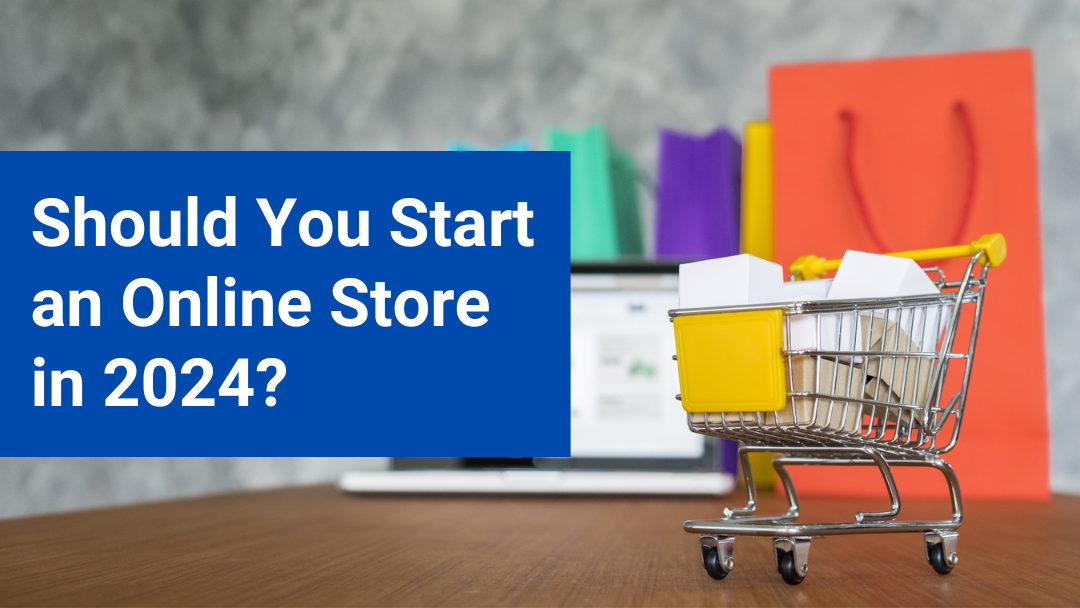Should You Start an Online Store in 2024?
Are you confused about whether to start an online store or upgrade your traditional brick-and-mortar store to an online store? If yes, this article is just for you as it will guide you on the pros and cons of starting an online store in 2024.
What is an online store?
An online store is a website or platform allowing businesses and individuals to sell products or services online. It functions as a digital counterpart to a traditional brick-and-mortar store, providing a virtual space where customers can browse, select, and purchase items.
Online stores are often part of a larger e-commerce ecosystem, which includes various online marketing strategies, social media integration, and data analytics to understand customer behavior and improve sales strategies. Examples of popular online store platforms include Amazon, Flipkart, Shopify, etc.
What is the e-commerce market size in India?
The e-commerce market in India is experiencing significant growth and is expected to continue its upward trajectory. In 2024, the market size is projected to reach approximately USD 112.93 billion, and it is anticipated to expand to USD 299.01 billion by 2029, growing at a compound annual growth rate (CAGR) of 21.5%.
Several factors contribute to this growth:
1) Increased Internet Penetration: The widespread availability of internet access, boosted by government initiatives like the Digital India campaign, has significantly increased the number of online users. By 2025, India is expected to have nearly 850 million internet users, with a significant portion from rural areas.
2) Government Support & Policies: The Indian government has implemented supportive policies, including 100% Foreign Direct Investment (FDI) in B2B e-commerce and initiatives like the Open Network for Digital Commerce (ONDC), which aims to democratize the e-commerce landscape and support smaller businesses.
3) Rise in Digital Payments: The growth of digital payment methods, such as UPI and digital wallets, has facilitated easier and more secure online transactions, further encouraging e-commerce adoption.
4) Urbanization and Smartphone Usage: Rapid urbanization and the increasing use of smartphones and other digital devices have made it easier for consumers to access e-commerce platforms, contributing to the sector’s expansion.
The combination of these factors creates a robust environment for e-commerce in India, making it one of the fastest-growing markets globally. This growth provides ample opportunities for businesses to expand their online presence and reach a broader customer base.
Benefits of upgrading an offline store to an online store:
Upgrading your offline store to an online store offers numerous benefits that can significantly enhance your business’s reach, efficiency, and profitability. Some of the reasons you should consider include:
1) Expanded Customer Reach: An online store is accessible to customers globally, allowing you to reach a much larger audience compared to a physical location limited by geographic constraints.
2) 24/7 Availability: Unlike a brick-and-mortar store with specific operating hours, an online store is open 24/7. This means customers can shop at any time that suits them, potentially increasing sales.
3) Convenience: Online shopping provides convenience for customers, enabling them to browse and purchase products from the comfort of their homes.
4) Cost-Effectiveness: Running an online store can be more cost-effective than maintaining a physical storefront. You can save on rent, utilities, and other overhead costs associated with a physical location.
5) Lower Operational Costs: With automation tools and efficient inventory management systems, running an online store can reduce the need for a large staff, thereby lowering operational costs.
6) Data Insights and Analytics: Online stores can utilize data analytics to track customer behavior, preferences, and purchasing patterns. This data can help in making informed business decisions, optimizing marketing strategies, and improving product offerings.
7) Marketing Opportunities: Digital marketing strategies, such as social media marketing, search engine optimization (SEO), email campaigns, and online advertising, can be highly effective and targeted. These tools help in reaching the right audience and driving traffic to your online store.
8) Personalization: An online store can offer personalized shopping experiences by recommending products based on customer browsing history and previous purchases. Personalization can enhance the customer experience and boost sales.
9) Scalability: It is easier to scale an online store to meet increasing demand compared to a physical store. You can quickly adjust inventory, add new products, and handle more orders without the need for physical expansion.
10) Competitive Edge: Having an online presence can give you a competitive edge, especially if your competitors are not yet online or do not have a robust online strategy.
11) Customer Engagement & Retention: Online stores can use various tools to engage customers, such as newsletters, loyalty programs, and social media interactions, helping to build and maintain a loyal customer base.
12) Adaptability: The ability to quickly adapt to market changes, trends, and customer preferences is greater online. You can update your product listings, prices, and promotions instantly to respond to market demands.
In summary, upgrading your offline store to an online store can significantly enhance your business’s reach, efficiency, and profitability by leveraging the advantages of digital technology and the internet.
Challenges with starting an online store in 2024:
Starting an online store in India presents various challenges that entrepreneurs must navigate to succeed in the competitive e-commerce landscape. Here are some of the key challenges:
1) Logistics and Delivery Infrastructure:
- Coverage: India’s vast and diverse geography poses significant challenges in terms of logistics and delivery. Reaching customers in remote or rural areas can be difficult and expensive.
- Reliability: Ensuring timely and reliable delivery is crucial for customer satisfaction, yet many logistics providers struggle with consistency, especially in less urbanized regions.
2) Payment & Security Issues:
- Payment Preferences: While digital payments are growing, a significant portion of the population still prefers cash on delivery (COD). Managing COD orders can complicate cash flow and increase the risk of non-payment.
- Fraud and Security: Online transactions are susceptible to fraud and cyber-attacks. Implementing robust security measures to protect customer data and prevent fraudulent activities is essential but can be costly and complex.
-
-
3) Regulatory & Compliance Hurdles:
- Changing Regulations: The e-commerce sector in India is subject to evolving regulations and policies. Keeping up with these changes and ensuring compliance can be challenging, especially for new entrants.
- Taxation: Navigating the complex tax landscape, including GST compliance, can be daunting for online businesses.
-
-
4) Competition and Market Saturation:
- High Competition: The Indian e-commerce market is highly competitive, with dominant players like Amazon and Flipkart setting high standards for service and pricing. New entrants often struggle to differentiate themselves and attract customers.
- Customer Loyalty: Building and maintaining customer loyalty in a market where consumers have numerous options and are highly price-sensitive can be difficult.
-
-
5) Technology & Infrastructure:
- Website & App Development: Creating a user-friendly and secure online platform requires significant technical expertise and investment. Many small businesses lack the resources to develop and maintain such infrastructure.
- Internet Connectivity: Despite improvements, internet connectivity issues persist in various parts of India, affecting the user experience and potentially limiting market reach.
-
-
6) Cultural & Behavioral Factors:
- Trust Issues: Many Indian consumers are still cautious about online shopping, particularly regarding payment security and product authenticity. Building trust and credibility can take time and effort.
- Customer Service Expectations: Indian customers often expect high levels of customer service, including easy returns and quick responses to queries. For young firms, constantly meeting these expectations might be difficult.
-
Addressing these challenges requires careful planning, investment in reliable logistics and technology, adherence to regulatory requirements, and a strong focus on customer experience. Despite these obstacles, the growing e-commerce market in India presents significant opportunities for businesses willing to innovate and adapt.
Should you start an online store in 2024?
Definitely yes, starting an online store in 2024 can be worthwhile considering the significant growth and potential in the e-commerce sector. Some of the reasons why you should consider starting an online store in 2024 include:
1) Market Growth: The e-commerce market in India is projected to reach USD 112.93 billion in 2024 and grow to USD 299.01 billion by 2029, with a CAGR of 21.5%. This rapid growth indicates a robust demand for online shopping.
2) Increased Internet Penetration: With nearly 850 million internet users expected by 2025, more people are gaining access to online shopping, particularly in rural areas, which expands the potential customer base.
3) Government Support: Initiatives like Digital India and the Open Network for Digital Commerce (ONDC) provide a favorable environment for e-commerce. The government’s support for digital payments and infrastructure development further facilitates the growth of online businesses.
4) Consumer Behavior Shift: The COVID-19 pandemic accelerated the shift to online shopping, with many consumers now preferring the convenience and variety of e-commerce. This trend is likely to continue as more people become accustomed to buying online.
5) Technological Advancements: Advancements in technology, such as AI and data analytics, allow for better customer insights, personalized shopping experiences, and efficient operations. These tools can help new online stores compete effectively in the market.
SUMMING UP
E-commerce industry is booming in India. Starting an online store in 2024 can be a lucrative venture given the positive market trends and increasing digital adoption in India.
However, it requires careful planning, addressing logistical and regulatory challenges, and a strong focus on differentiation and customer satisfaction. With the right approach, an online store can tap into the vast potential of the growing e-commerce market in India.

